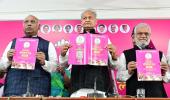The scarcity of resources is particularly evident in the case of Rajasthan compared to many other states.

Announcing and promising one scheme after another during the assembly election campaign, Rajasthan Chief Minister Ashok Gehlot has been telling people, 'Tum maangte maangte thak jaaoge, main dete dete nahi thakunga (you will tire of asking, but I won't tire of meeting your demands).'
Gehlot, whose Congress party lost the 2023 assembly election on Sunday, may be forgetting the basics of economics: While needs and wants are unlimited, resources are scarce.
The scarcity of resources is particularly evident in the case of Rajasthan compared to many other states.
These schemes, such as providing smartphones to 13.5 million women, granting every resident of the state emergency health care treatment without payment at health care establishments that received concessional land and buildings from the government, offering free electricity up to 100 units, subsidising liquefied petroleum gas (LPG) cylinders to make them available at Rs 500 each, and gifting scooters to meritorious girls, may be hailed as social welfare programmes or criticised as freebies.
Still, they strain the already precarious state finances.
The state's debt has never been less than 30 per cent of the gross state domestic product (GSDP) in the past 10 years, except for the first year of the Bharatiya Janata Party government led by Vasundhara Raje (2014-2015).
However, it was less than 35 per cent during the BJP government, and it crossed 35 per cent during the current Congress regime.
It reached a peak of 40.5 per cent in 2020-2021, a year heavily impacted by the first wave of Covid, leading to lockdowns and increased government expenditures.
However, the Comptroller and Auditor General of India found that the debt was understated by 0.19 per cent due to off-Budget borrowings by the state.
According to CAG's calculations, the debt stood at a staggering 42.56 per cent of GSDP that year.
Afterwards, the debt fell below 40 per cent of GSDP, but it is still expected to stand at 36 per cent in 2022-2023 and 36.8 per cent in 2023-2024, according to projections.

A study by the Reserve Bank of India last year classified Rajasthan as one of the five states under high financial stress.
Half of Rajasthan's revenue expenditure goes toward committed expenses -- salaries, pensions, and interest payments.
Even in the final year of the Vasundhara Raje government, the state's committed expenditure was high, accounting for 55 per cent of revenue expenditure.
However, this is expected to decrease to 49 per cent in 2022-2023 and 50.2 per cent in 2023-2024.
Part of this reduction may be attributed to the state's adoption of the old pension scheme (OPS).
Pension liabilities under the National Pension System (NPS) have decreased, with new liabilities expected to arise under OPS after 2034.
In fact, Rajasthan reduced its allocation to NPS from Rs 1,926 crore (Rs 19.26 billion) in 2021-2022 (actuals) to Rs 5 crore (Rs 50 million) in 2023-2024 (Budget Estimates).
This, along with other categories of revenue expenditure, leaves little for investment in generating assets.
Capital outlays have remained below 15 per cent of the total expenditure in the past decade, falling to as low as sub-8 per cent during the first two years of the Gehlot government when the economy slowed down.
Rajasthan has not had a revenue surplus in the past 10 years, and it maintains a high fiscal deficit, although it was even higher during a couple of years of the Vasundhara Raje government (2015-2016 and 2016-2017).
However, the state's own tax revenues may account for around 50 per cent of its revenue receipts in the current financial year (2023-2024) if the Budget's projections come true.
This would be the highest in the state in the past decade.
Nevertheless, the Centre's grants and devolution are projected to constitute 40.8 per cent of the state's revenue receipts during the year.
Some of the freebies, such as subsidised LPG cylinders, may be necessitated by high inflation in the state, which has exceeded the all-India average for the past year and a half.
While the all-India average saw the retail inflation rate drop below 6 per cent, which is within the RBI's comfort zone, in September, it still stood at 6.53 per cent in the state.
Food and beverage inflation was also higher in the state at 6.45 per cent compared to the national average of 6.3 per cent during that month.

Other freebies, such as providing scooters to meritorious girls, may also be viewed in the context of the low female literacy rate in the state.
While the overall literacy rate for individuals above seven years of age stood at 73.4 per cent in the state, it was significantly lower than the all-India average of 80.3 per cent in 2022-2023.
Female literacy was even lower at just 62.5 per cent, compared to the national average of 74.2 per cent, according to the Periodic Labour Force Survey.

Feature Presentation: Aslam Hunani/Rediff.com











